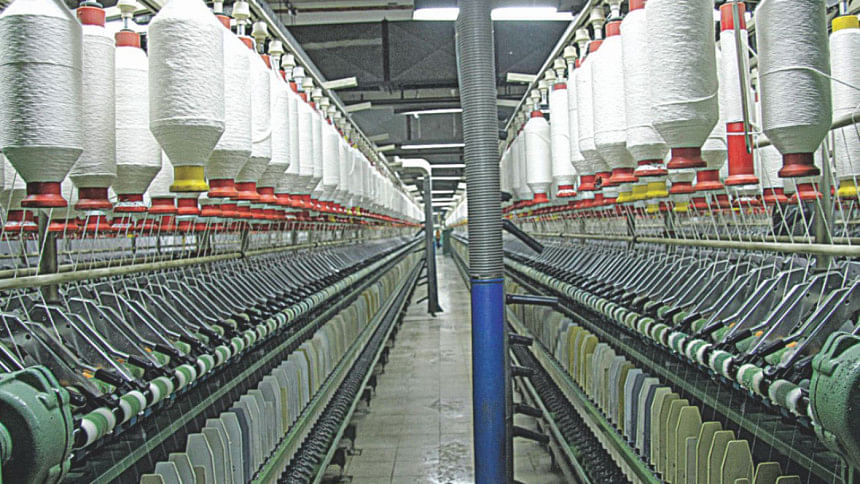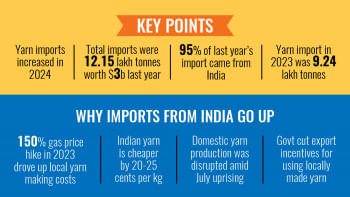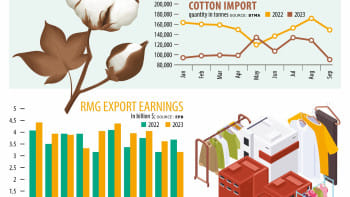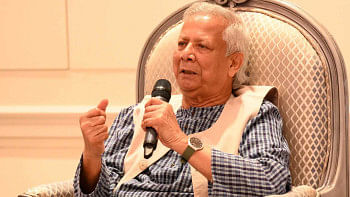Yarn import curb thru land ports raises mixed reactions

The National Board of Revenue (NBR) has restricted yarn imports through land ports to protect the local textile and spinning sector from Indian imports of the raw material — a move hailed by textile millers but opposed by garment and knitwear exporters.
Apparel exporters said they could import yarn from neighbouring India through land ports in as little as a week. Now, their lead time will increase, affecting competitiveness in the global market.
The decision comes over two weeks after the commerce ministry recommended limiting yarn imports, citing that an influx of imported raw materials for the apparel industry had led to significant losses for domestic textile millers.
Local yarn manufacturers are unable to compete with imported yarn, as importers often declare lower values for shipments brought in through land ports compared to those arriving via Chattogram port, the ministry said earlier.
The recommendation followed pleas from local textile millers.
In a notification issued on April 13, the NBR blocked yarn imports through the Benapole, Bhomra, Banglabandha, Burimari, and Sonamasjid land ports. The restriction took effect immediately.
"This is not a good decision," said Md Fazlul Hoque, managing director of Plummy Fashions Ltd, a leading knitwear exporter.
Already, Bangladesh's exports face a 10 percent additional tariff in the US market. They will have to compete with Indian apparel there, too. In such a situation, any restriction on yarn imports through land ports will affect export-oriented apparel makers.
Hoque added that exporters can buy yarn at lower prices from India. "Such a restriction is not right in an open market economy," he said.
Hoque, also a former president of the Bangladesh Knitwear Manufacturers and Exporters Association (BKMEA), said the NBR curbed yarn imports via land ports in 2004 on allegations of misuse, adding that the NBR had shifted the burden of its inefficiencies onto exporters.
"The question is why the NBR failed to build its capacity to check misuse of imports through land ports," he said. "The NBR should keep yarn imports open for export-oriented factories.
"The authorities should take measures to prevent any sort of irregularities, but they must keep the option for the quick import of yarn open."
Sharif Zahir, managing director of Ananta Group, a major apparel exporter, said importing through seaways would increase the lead times of garment exporters by up to two weeks.
"This has been done to protect spinners. But the government should give priority to garments," he said.
Zahir said such measures should be temporary in view of the bilateral relationship between the two countries.
However, the Bangladesh Textile Mills Association (BTMA) said in a statement that the backward linkage industries of the textile sector would be strengthened following the curb on yarn imports through land routes.
This will save foreign currency and increase local value addition, the BTMA said. Besides, this will also prevent money laundering through informal money transfers such as hundi, it added.
The BTMA believes the NBR will have full control if yarn is brought over through seaports.
BTMA President Showkat Aziz Russell said exporters bring yarn from India's Gujarat through seaports. So, the curb on imports through land ports will not affect exporters. Instead, it will be helpful for the local weaving sector, he added.
India last week revoked the transhipment facility offered to Bangladesh's export cargo destined for third countries via its land borders to Indian airports and seaports. However, the neighbouring country claimed that the move would not affect Dhaka's trade with Nepal and Bhutan through Indian territory.
The measure is expected to increase costs for Bangladesh's apparel exporters, many of whom ship orders to Western markets through Indian airports, particularly the Indira Gandhi International Airport in New Delhi.
Previously, exporters transported goods overland through the Benapole–Petrapole border en route to Indian airports, including those in Kolkata and Delhi, for onward air shipment to global destinations.

 For all latest news, follow The Daily Star's Google News channel.
For all latest news, follow The Daily Star's Google News channel. 






Comments